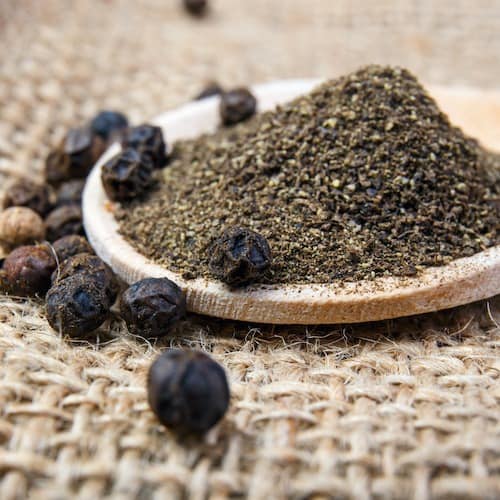Black Pepper: Health Benefits, Nutrition, and Uses
Commonly referred to as the “King of Spices”, black pepper has been used around the globe for centuries. Since ancient times, black pepper, scientifically known as Piper nigrum, has been a staple ingredient since it acted as a powerful flavor enhancer.
Aside from making virtually any recipe tastier and spicier, this powerful spice has also found its application in medicine due its numerous health benefits. It was even considered a sacred offering that people used to present the gods with. In this article, we’ll help shed more light on the origins of black pepper, nutrition facts, health benefits, and its medicinal and culinary uses.
Origins of black pepper
Coming from the Piperaceae family, genus Piper, black pepper is a fruit obtained from the pepper plant. Native to India, black pepper comes from the berries of the plant, and it is made by drying the half ripe pepper berries. The berries are picked before they turn red, and they get darker as they dry.
The fact that black pepper is picked at this certain stage of development gives it its recognizable hue. The presence of piperine, a volatile oil and a bioactive, is responsible for its strong, pungent flavor and biting spiciness. Black pepper is available year-round since it is not a seasonal plant, and it is one of the earliest known spices.
Nutrition facts for black pepper
Moving on to the nutritional profile of black pepper, this powerful spice is a source of a number of vitamins, minerals, and nutrients. When it comes to vitamins, black pepper contains niacin, riboflavin, thiamin, as well as vitamin B6, vitamin K, vitamin E, and folate (vitamin B9).
As for the minerals, black pepper is a great source of copper, iron, chromium, calcium, and manganese, as well as potassium, phosphorus, magnesium, and sodium. Finally, when it comes to nutrients, black pepper contains protein, carbohydrate, and dietary fiber.
Health benefits of black pepper
When it comes to health benefits of black pepper, this spice is praised for its numerous health-promoting and disease-preventing properties. For starters, black pepper is great for detoxifying the body, promoting digestion, as well as preventing diarrhea. Because of its natural ability to enhance nutrient and vitamin absorption, black pepper extract is also an ingredient found in dietary supplements. It can also help increase the function of particular nutrients.
Black pepper is also known for its role as a powerful antioxidant. Thanks to the anti-inflammatory compounds it contains, black pepper also provides protection against cellular damage, inflammation, and disease.
Medicinal uses of black pepper
Black pepper has a wide range of applications in traditional medicine. Thanks to its antibacterial properties, black pepper is commonly used in treating insect bites and can be of great help in combating infections. Its anti-inflammatory and antioxidant properties make it quite beneficial for patients suffering from peptic ulcers as well as gastric mucosal damage since it provides relief.
When added to tonics as a part of Ayurvedic practices, black pepper is said to provide respiratory relief, combating cough, cold, nasal congestion, and sinusitis. Black pepper is also used to treat skin problems. When crushed, it becomes a quick and easy natural DIY remedy for soothing and smoothing the skin. Some other medical uses of black pepper include reducing joint pain, preventing constipation and any sort of cancer, improving memory, and treating depression.
Culinary uses of black pepper
One of the most versatile spices in the world, black pepper is commonly sold in markets and grocery stores. It’s usually added near the end of the cooking process in order to preserve the flavor. Adding it too early in the process causes black pepper to lose its flavor. Therefore, it’s best done when the meal is almost ready – ideally, you’ll use the one that’s been freshly ground.
When added to food, black pepper helps enhance nutrient bioavailability and accessibility to our system. This helps maximize the efficiency of the food that we consume while at the same time making it delicious. Aside from food, black pepper can also be added to green tea. Consuming this drink two to three times per day can be a great way to lose weight naturally and without dieting, which is yet another great reason to add black pepper to your everyday diet.
Wrapping up
They say that variety is the spice of life, and adding black pepper to your meals will not infuse your dishes with delightful aroma but also allow you to reap a number of health benefits in the process.
Whether you’re someone who’s looking to boost their overall health, lose weight, improve their digestion, or simply enjoy their favorite savory dishes even more, black pepper is one of the ingredients you should definitely consider adding to your daily menu.







About The Author: Callumfatweb
More posts by Callumfatweb